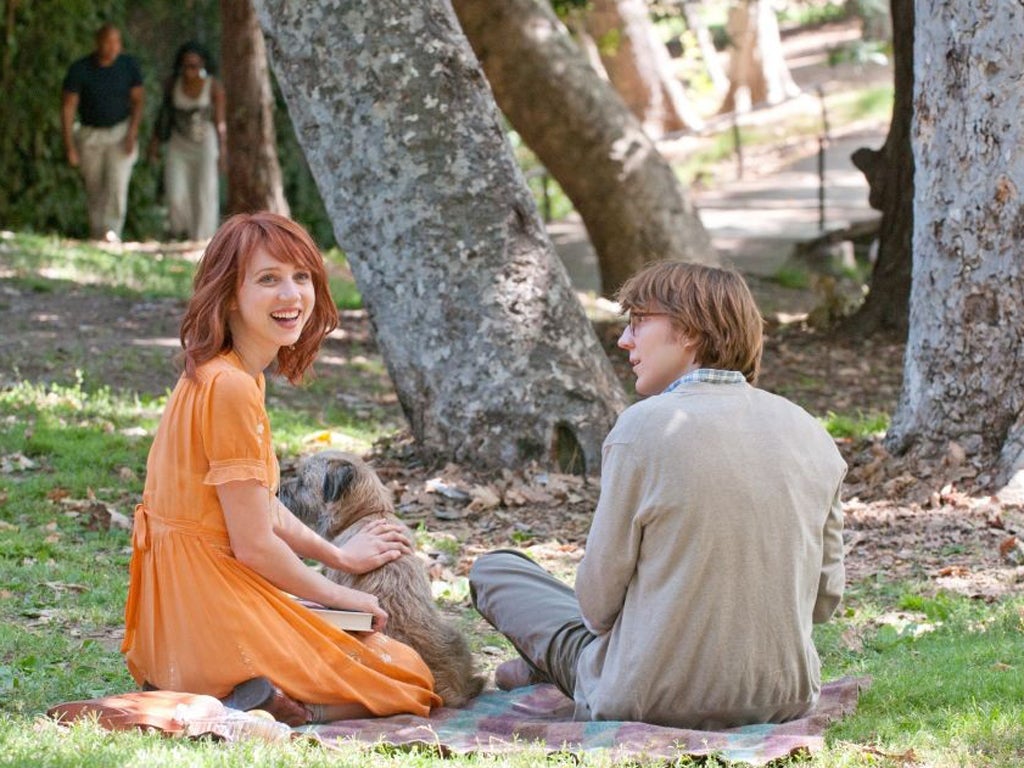Ruby Sparks, Jonathan Dayton & Valerie Faris, 104 mins (15)/ Hotel Transylvania, Genndy Tartakovsky, 91 mins (U)
Typical! You create the girl of your dreams and then the sparks fail to fly

One of the themes of Ruby Sparks is the difficulty of producing a follow-up to an award-winning hit, so you can see why the screenplay might have chimed with Jonathan Dayton and Valerie Faris, the directors of Little Miss Sunshine. In their new film, the character with second-album syndrome is played by Paul Dano. He wrote a best-selling debut novel when he was 19, but a decade later he still hasn't managed a second. Dano, by the way, is a bespectacled nerd who uses a manual typewriter, and who goes to a therapist (Elliott Gould) to moan about being single. In other words, he's a Woody Allen clone – and the film's Pygmalion scenario could have come straight from one of Allen's short stories.
On his therapist's prompting, Dano starts writing about his ideal woman, the kind of perky, free-spirited kook whose sole function in indie romantic comedies is to help the dweebish hero loosen up. But then this fantasy woman, Zoe Kazan, materialises in Dano's house. Sensibly, Ruby Sparks doesn't try to explain how or why this happens. All Dano knows is that he is, literally, living with the woman of his dreams, to the amusement of his brother, Chris Messina, and the fascination of an unctuous fellow novelist, Steve Coogan.
The film touches lightly upon all sorts of intriguing ideas – from the dangers of idealising your partner to the adolescent sexism of so much male writing. But having touched upon those ideas, it doesn't develop them with the rigorous wit that Allen might once have brought to bear. After Dano and Kazan have visited his hippy mother, Annette Bening, and his stepfather, Antonio Banderas, Ruby Sparks drifts from satirical comedy to bleak drama, but doesn't offer any more insights along the way.
The film's shortcomings are most apparent later on when Dano bumps into his ex-girlfriend. At last, we're watching a real argument between real people with real grievances, and, for the first time in Ruby Sparks, sparks fly. Kazan's scenes are inert by comparison, because she never makes the transition from being a living doll to a flesh-and-blood individual we can care about. The irony is that Kazan wrote the screenplay herself, and plays the title role. But in the end, Dano's dream girl is still as fuzzy and insubstantial as a dream.
Hotel Transylvania is the third recent children's film to concentrate on the offspring of a mythological figure, following Hop (the Easter Bunny) and Arthur Christmas (Santa). This time it's Count Dracula's turn. His daughter Mavis is almost 118, which apparently translates to 18 in vampire years, but she's never once left the grand hotel he runs for werewolves, zombies, mummies and witches. Dracula is determined to keep Mavis hidden from human persecutors, but his efforts are foiled when a spaced-out backpacker wanders into the hotel and into Mavis's affections.
I have my reservations about the message that a girl can't break free from her over-protective dad unless she hooks up with a boy her own age (give or take a century). But otherwise, Hotel Transylvania is worth checking out. It doesn't have the scope of a Disney or Pixar classic, but it's something like the creature you'd get if you stitched together various limbs and organs from The Munsters and Fawlty Towers. Voicing the Basil Fawlty role, Adam Sandler is a delightfully tightly wound yet sympathetic Dracula. For the first time in what seems like 118 years, Sandler's performance doesn't make you want to ram a wooden stake through his heart.
Critic's Choice
Elizabeth Olsen lights up the campus in Josh Radnor’s breezy but hightoned US indie comedy Liberal Arts. The 56th BFI London Film Festival continues, with new releases, such as Ben Affleck’s Argo, revivals, including Hitchcock’s little-seen 1929 drama The Manxman, and (tonight) intense real-life drama Beyond the Hills from the Romanian Palme d’Or winner Cristian Mungiu.
Subscribe to Independent Premium to bookmark this article
Want to bookmark your favourite articles and stories to read or reference later? Start your Independent Premium subscription today.

Join our commenting forum
Join thought-provoking conversations, follow other Independent readers and see their replies